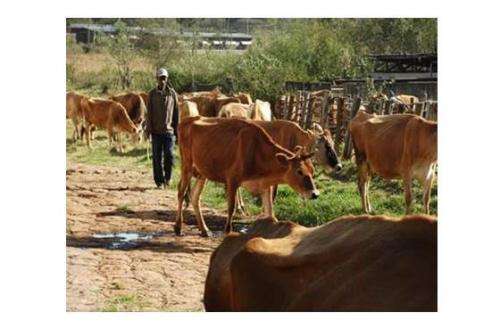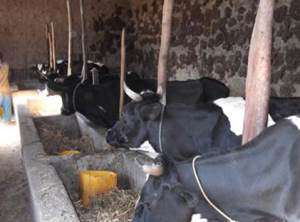Neospora caninum: An underestimated cause of reproductive disorders in dairy production and breeding cattle in Ethiopia

Kassahun Wondim's PhD research shows that the protozoan parasite, N. caninum, is a more frequent cause of miscarriage and stillbirth in intensive and semi-intensive dairy production in Ethiopia than the BVD virus and the Brucella bacterium.
Much has been done to improve the efficiency of dairy production in Ethiopia, but productivity has nevertheless not increased as expected. There may be many reasons for this and reproduction disorders are one explanation.
Reproductive disorders in cattle are the result of many factors but they can be broadly divided into two categories: infectious or non-infectious. Infectious causes can be due to a large number of different organisms, including bacteria, viruses and parasites, which together pose major problems for dairy production.
In Ethiopia, brucellosis in cattle herds has been monitored since the 1970s and abortions and stillbirths in cattle have generally been believed to be caused by this disease. But Brucella cannot be the only explanation for the high incidence of Urban and peri-urban dairy farm (Photo: Kassahun A. Wondim)abortions and stillbirths, particularly in intensively managed livestock production. To date, there has been limited knowledge about other possible infectious agents causing reproductive disorders.
The aim of Wondim's research project was to investigate whether bovine brucellosis really was the main cause of reproductive disorders in cattle in Ethiopia, as was generally assumed. A substantial number of cattle from large dairy herds were examined to find out whether they tested positive for the Brucella bacterium. The results of the study revealed that the prevalence of brucellosis in the herds examined was low and that abortion and stillbirths could not be linked to this bacterium. Wondim then carried out a case-control study to compare the cattle's exposure to BVDV, Brucella and Neospora caninum. The results of this study show that the incidence of N. caninum amongst cattle affected by reproductive disorders was three times higher than amongst the control group, whereas there was no difference between the case group and the control group as regards the incidence of Brucella and the BVD virus.

A third of the herds examined had one or more animals with antibodies against N. caninum. Bovine neosporosis therefore seems to be relatively common amongst these herds. The parasite was detected in brain tissue from four aborted foetuses and one calf with congenitally defects, all born of seropositive dams. Oocysts (thick-walled spores) from N. caninum were found in 4% of dogs living on the farms.
Wondim's doctoral research shows that bovine neosporosis can be a major explanation for the disappointing results and low productivity of Ethiopian dairy production. In order to combat this parasite, there should be improvements in farm level biosecurity, dog population control and waste disposal practices.
Kassahun Asmare Wondim defended his doctoral research on 16th October 2013 at the Norwegian School of Veterinary Science with a thesis entitled: "Neospora caninum: an underestimated cause of reproductive disorders in intensively/semi-intensively managed dairy and breeding cattle in Ethiopia."
Provided by Norwegian School of Veterinary Science



















